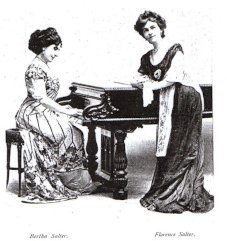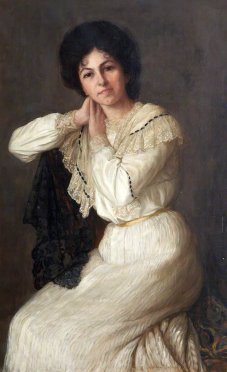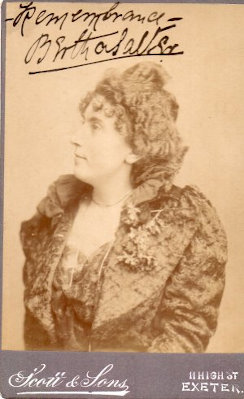The Salter Sisters: Devon's Beloved 'Devonshire Nightingales'

Portrait of the Salter Sisters
The Salter Sisters: Devon’s Beloved “Devonshire Nightingales”
Florence and Bertha Salter, affectionately known as the “Devonshire Nightingales”, were celebrated classical vocalists originating from the picturesque village of Colebrooke, Devon. Their melodious voices and remarkable careers have left a lasting legacy in the world of classical music.
Early Life and Rise to Fame
Born at Broomhill Farm in 1870 (Florence) and 1872 (Bertha), the Salter sisters grew up surrounded by the serene beauty of rural Devon. Their musical journey began with a promising concert at Crediton Town Hall in 1890. Encouraged by their talented singing instructor, Mr. Jekyll of Exeter, the sisters pursued professional training in Brussels, refining their vocal artistry.
In 1893, their undeniable talent brought them before Queen Marie Henriette of Belgium and Princess Clementine, a royal audience that solidified their reputation. Their performances in Biarritz, attended by King Oscar of Sweden, also earned widespread acclaim, with the French press hailing their extraordinary abilities.
A Flourishing Career: The Devonshire Nightingales
For over two decades, the Salter sisters captivated audiences across Britain and Europe. Touring extensively, they gained the affectionate title of the “Devonshire Nightingales." By 1901, the sisters had settled in Paddington, London, listed as “classical vocalists” in the census. A decade later, they moved to Chelsea, continuing to thrive as “professional vocalists.”
One of their final recorded performances occurred in September 1917, where they sang to support a military hospital in Colchester, demonstrating their commitment to using their talents for good causes.
Returning to Devon: A Quiet Retirement
In the 1930s, Florence and Bertha returned to their Devon roots, settling in the seaside town of Dawlish. Florence passed away in 1942 and was buried in Colebrooke cemetery, near their parents' resting place. Bertha moved to East Wyke, South Zeal, and after her passing in 1959, she was laid to rest beside her sister. Their graves, adorned with granite surrounds and lead inscriptions, reflect their enduring legacy.
- Florence Salter: “Singer” born February 2nd, 1870, died October 6th, 1942. Inscription: “Glory be to God on High."
- Bertha Salter: “Singer” born May 24th, 1872, died March 13th, 1959. Inscription: “And one clear call for me," a poignant line from Alfred Lord Tennyson’s poem Crossing the Bar.
Legacy and Cultural Impact

Painting of Florence Salter by Jean Ballantyne
The Salter sisters' contributions to classical music remain timeless. A portrait of Florence by Jean Ballantyne, initially misattributed to Bertha, now hangs in the Devon and Exeter Institution, thanks to Florence’s generous bequest to Exeter University. The portrait serves as a testament to their cultural significance.
Ballantyne, the daughter of R.M. Ballantyne (author of The Coral Island), was a close friend and neighbour of the sisters in London. Her artistic connection adds another layer to the sisters’ fascinating story.
Celebrating the Devonshire Nightingales
Today, the Salter sisters are remembered not only for their extraordinary voices but also for their deep connection to Devon. Their story, immortalized in Colebrooke cemetery and celebrated in historical records, continues to inspire music lovers and historians alike.

Bertha Salter